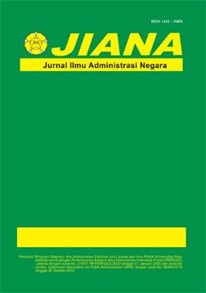IMPLEMENTASI PROGRAM KAMPUNG KELUARGA BERENCANA
DOI:
https://doi.org/10.46730/jiana.v18i2.7934Keywords:
Implementation, Family Planning, Cadres, Main Tasks and Functions.Abstract
Implementation of the Family Planning Village Program. Increasing population growth has led the Kampar District Government to run a family planning village program, one of which is in Kampar Kiri Hulu Subdistrict, Tanjung Belit Selatan Village. The Kampar Regency Government, Riau Province established Tanjung Belit Selatan Village as one of the Family Planning (KB) villages. KB Village Services will also be integrated with other sectors, such as education, health, and social. But the phenomenon that occurs is that this program has not run as expected, many people do not know the benefits of the KB village, then the lack of human resources that run it. Then the obstacle is that the local regional government cannot unite other related agencies, for example the population office and the health department. The purpose of this study was to determine the Implementation of the Family Planning Village Program in Tanjung Belit Selatan Village, Kampar Kiri Hulu District. In this study the authors used a descriptive qualitative research type. Primary data were obtained directly through interviews from the Kampar Kiri Hulu Sub-District Chief informant, PKB Coordinator, KB village cadre and Tanjung Belit Selatan village community. The results of this study indicate that the Implementation of the Family Planning Village Program in Tanjung Belit Selatan Village is going well, but changes must be made on the empowerment and training side as well as the socialization of KB family cadres as the spearhead in the distribution of information to the people of Tanjung Belit Selatan Village. Cadre, then the management needs information such as training and socialization specifically in the KB village program, the implementers are considered to need to master the existing technical instructions. In implementing the implementation, the KB Village Technical Guidelines are also very necessary, because with the standard, namely the operational guidelines (Implementation Guidelines ), it is hoped that the activities in the KB village program will run well, therefore training must be carried out continuously and evenly.References
Slameto. (2010). Belajar dan Faktor-faktor yang Mempengaruhinya. Jakarta : Rineka Cipta.
Afifiddin dan Saebani, Bani Ahmad. 2012. Metodologi Penelitian Kualitatif. Ban-dung; CV Pustaka Setia
Dunn, William N. 2000. Pengantar Analisis Kebijakan Publik. Yogyakarta: Gajah Mada University Press
Islamy, M. Irfan, 2000. Prinsip-Prinsip Pe-rumusan Kebijakan Negara. Jakarta: Sinar Grafika
Juliartha, Edward. 2009. Model Implementa-si Kebijakan Publik. Jakarta: Trio Rimba Persada
Moleong, Lexy J. 2004. Metode Penelitian Kualitatif. Bandung: PT. Remaja Rosdakarya
Narbuko, Sholid, dkk. Metedologi Penelitian. Jakarta; PT. Bumi Aksara
Nugroho D, Riant, 2005. Kebijakan Publik: Formulasi, Implementasi dan Evaluasi. Jakarta: PT. Elex Media Komputindo
Saryono, 2010. Metode Penelitian Kualitatif. Bandung: Alfabeta Silalahi, Ulber. 2009. Metode Penelitian Sosial. Ban-dung; PT. Refika Aditama
Sugiyono, 2013. Metode Penelitian Pendidi-kan (Pendekatan Kuantitatif, Kualitatif, dan R&D. Bandung: Alfabeta
Tachjan, Dr. H, M.Si. 2006. Implementasi Kebijakan Publik. Bandung: AIPI
Wahab, Solichin Abdul. 2006. Analisis Ke-bijakan: dari formulasi ke Implementa-si Kebijakan Negara. Jakarta: PT. Bumi Aksara.
Downloads
Published
How to Cite
Issue
Section
License
The copyright of the received article shall be assigned to the journal as the publisher of the journal. The intended copyright includes the right to publish the article in various forms (including reprints). The journal maintains the publishing rights to the published articles.
Authors are permitted to disseminate published articles by sharing the link/DOI of the article at the journal. Authors are allowed to use their articles for any legal purposes deemed necessary without written permission from the journal with an acknowledgment of initial publication to this journal.

Jurnal Ilmu Administrasi Publik is licensed under a Creative Commons Attribution-NonCommercial-ShareAlike 4.0 International License.




